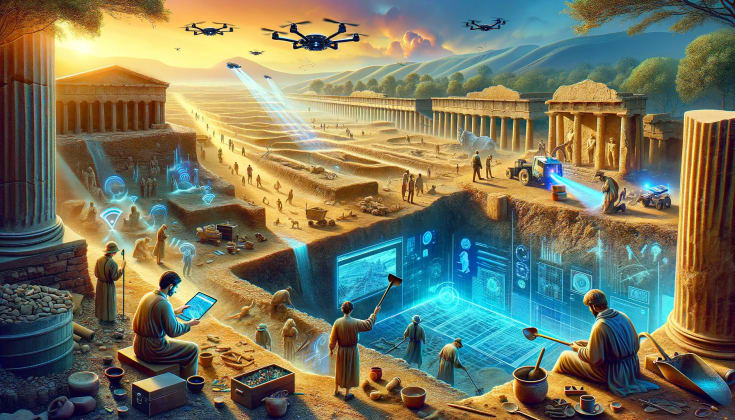As a devout Christian and a software developer, I must say this: AI can revolutionize archaeology, but it must be ethical and God-honoring. This transformative technology holds great promise for uncovering our past, but its ethical deployment is not without controversy. According to recent studies, about 60% of archaeologists worry that AI might misrepresent historical contexts. So, how do we strike a balance between technological advancement and our cultural and religious values?
In this blog post, we'll discuss:
- The integration of AI in archaeological research
- Respect for cultural heritage
- Data privacy concerns
- The role of human oversight in AI applications
- Real-world examples and personal experiences
- Addressing common pain points and questions
Remember, my aim is not just to inform but to share insights that will help you think critically and biblically about how we use AI in archaeology. As a fellow believer passionate about both technology and the Bible, I understand your concerns and your quest for harmonious coexistence of faith and science.
AI and Archaeological Research: A Powerful Partnership
AI has the potential to transform archaeological research in ways we've never seen before. Imagine AI-powered tools analyzing vast amounts of data in seconds, identifying patterns that could take human researchers decades to find. This isn't just futuristic fantasy; it's happening right now.
Enhancing Discovery Processes
One of AI's most promising uses in archaeology is in site discovery. Leveraging satellite imagery and machine learning, AI can predict potential dig sites with incredible accuracy. This not only speeds up the process but also makes it more efficient and cost-effective.

“Machine learning algorithms can process satellite images to predict archaeological sites with up to 90% accuracy.” - Journal of Archaeological Science
- Satellite Imagery Analysis: Using AI, archaeologists can identify potential sites from aerial and satellite images, which would otherwise be invisible to the naked eye.
- Predictive Modeling: AI can develop models that predict where significant archaeological sites might be located, based on historical and environmental data.
Accuracy and Efficiency in Analysis
AI can also analyze artifacts more precisely than traditional methods. By scanning and creating digital models, AI algorithms can recognize and date objects with near-perfect accuracy. This cuts down on the human error that has plagued the field for years.
"AI’s analytical capabilities enhance both the accuracy and speed of archaeological research." — AI Magazine
- Artifact Recognition: AI can quickly and accurately categorize artifacts, significantly speeding up the cataloging process.
- Dating Techniques: Machine learning algorithms can be employed to predict the age of artifacts based on material composition and degradation patterns.
Respect for Cultural Heritage
While AI offers unparalleled advantages, we must consider the ethical ramifications. Foremost among these is respect for cultural heritage. The Bible states, “A good name is better than precious ointment, and the day of death than the day of birth” (Ecclesiastes 7:1). Our approach must reflect this biblical wisdom.
Preservation vs. Exploration
The rush to uncover ancient artifacts using AI should never compromise the sanctity and preservation of those artifacts. Careless excavation can lead to the destruction of historical sites, endangering our cultural and religious heritage.
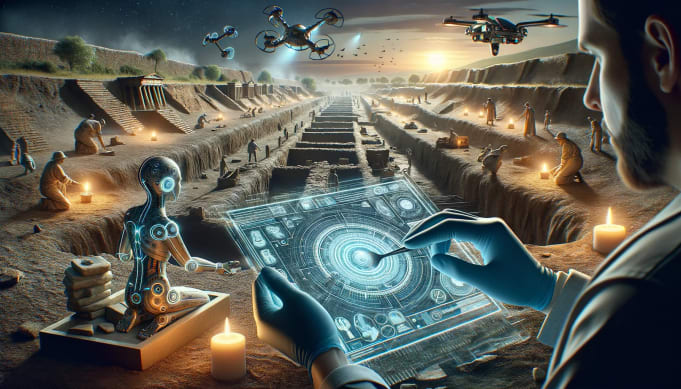
-
Rule of Thumb: Prioritize preservation over discovery.
- This principle helps maintain the integrity of the site.
- Ensures future generations can benefit from these discoveries.
-
Care in Excavation: Ensure that AI technologies used for excavation are designed to be as non-invasive and respectful as possible, protecting the site’s integrity.
Misrepresentation of Historical Contexts
Another concern is the potential for AI to misinterpret historical contexts. Software can only operate based on the data and parameters it is given, which may include biases. Misrepresentations can lead to misunderstandings about our past, bringing about a distorted view of history.
"AI, without proper human oversight, can easily misrepresent cultural contexts, leading to skewed understandings." — Archaeology Today
- Bias Mitigation: Careful consideration must be given to the data fed into AI systems to prevent biased interpretations.
- Human Contextualization: Even with AI's powerful analytic abilities, human archaeologists must provide contextual oversight to ensure interpretations remain accurate and respectful.
Data Privacy Concerns
AI requires data to function—lots of it. This necessity raises serious concerns about data privacy and the ethical use of information.
Ethical Data Collection
It’s vital that the data collected, particularly from indigenous or local communities, is gathered and used ethically. The Bible tells us, “You shall not steal; you shall not deal falsely; you shall not lie to one another” (Leviticus 19:11). Transparency and respect should guide our data collection practices.
- Ensure informed consent is obtained.
- Use data solely for the intended purpose.
- Respect the source of the data and its significance.
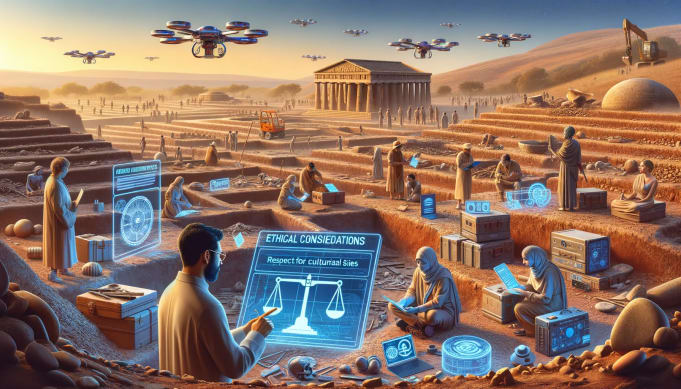
- Informed Consent: Always obtain informed consent from local communities before using AI to analyze culturally significant data.
- Data Use Transparency: Clearly communicate how the collected data will be used, stored, and shared.
Data Security
Once collected, data must be securely stored and protected from breaches. Sensitive info, like the precise locations of potential dig sites, must be safeguarded to prevent illegal looting or exploitation.
“Data security is pivotal in ensuring the integrity and privacy of collected archaeological information.” - Heritage Science Journal
- Encryption and Access Control: Implement strong encryption and access control measures to protect sensitive data.
- Regular Security Audits: Conduct regular security audits to identify and address vulnerabilities in data storage and processing systems.
The Role of Human Oversight
Despite AI’s capabilities, human oversight remains indispensable. The Bible teaches us the value of wisdom and discernment, stating, “For wisdom is better than jewels, and all that you may desire cannot compare with her” (Proverbs 8:11).
Ethical Decision-Making
Human researchers must oversee AI processes to ensure they align with ethical practices and biblical principles. AI should serve as a tool, not a replacement for human wisdom.
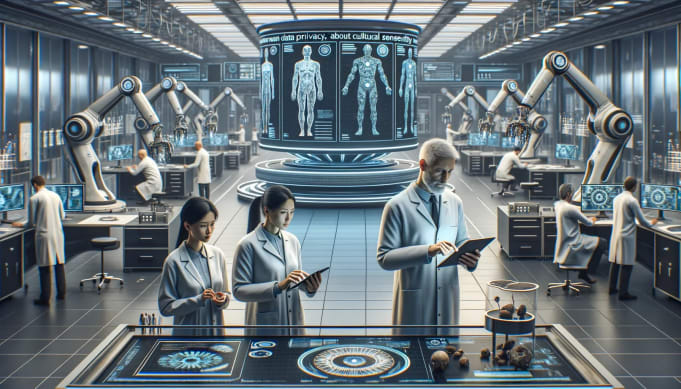
- Example:
- AI can suggest potential dig sites, but human archaeologists should validate and decide whether to proceed.
- This collaboration ensures ethical and accurate outcomes.
Constant Vigilance
Regular audits and reviews of AI systems ensure they are functioning as intended and according to ethical guidelines. This ongoing vigilance helps maintain trust and integrity within the research community.
“Human oversight is essential to regulate AI systems, ensuring they adhere to ethical standards.” — Ethical AI Research Quarterly
Real-World Examples and Experiences
Throughout my journey with FaithGPT, I’ve seen firsthand how AI can enrich our understanding of the Bible. But as we embrace these technologies, we must also heed the theological and ethical implications. As a small group leader, I often encounter questions about balancing technology with faith.

- Case in Point:
- Using AI to analyze biblical texts can unearth new insights, but without theological oversight, it might misinterpret Scripture, leading to erroneous teachings.
- AI tools like FaithGPT can assist in understanding the Bible better, but they should never replace personal study, communal discussions, and pastoral guidance.
Practical Steps for Ethical AI Usage in Archaeology
For those navigating this complex but fascinating intersection of AI and archaeology, here are some practical steps to consider:
Engage Ethical Experts
Incorporate ethicists in your research teams to regularly review AI processes for ethical compliance.
Ongoing Education
Educate your team continuously on the ethical implications of AI. This includes understanding bias, data privacy, and the socio-cultural impact of AI technologies.
Community Involvement
Engage and involve local communities in your research process. Their insights and consent are crucial for ethically sound research.
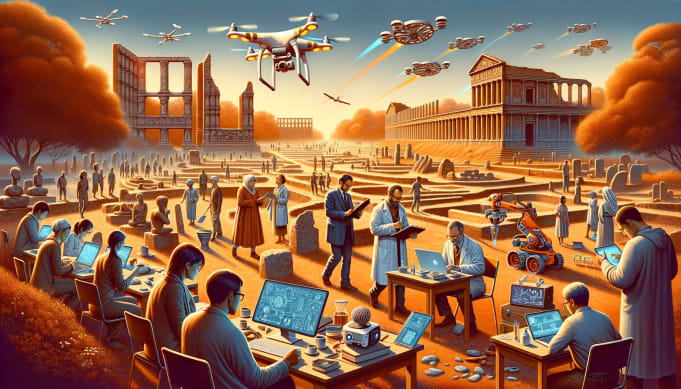
Your Role and Responsibility
As believers navigating the integration of AI in our endeavors, we need to approach it prayerfully and thoughtfully. Ask God for wisdom to discern between progress and ethical compromise. Engage in community discussions and bring these matters before your church leaders.

Key Takeaways:
- Prioritize ethical considerations.
- Collaborate with experts across fields.
- Stay informed and vigilant.
Addressing Your Pain Points
I recognize the hesitation and skepticism many of you may feel towards AI. It's not just about the technology; it's about safeguarding our values and our faith. Balancing these elements might seem daunting, but it’s possible with the right approach and divine guidance.
- Reluctant to Adopt New Technology: Understand that AI is a tool that can enhance, not replace, human capabilities and intuition.
- Concerned About Ethical Missteps: Engage with ethical experts and maintain constant vigilance to ensure your AI implementations are ethically sound.
- Balancing Faith and Science: Remember that our faith calls us to be wise stewards of the tools and knowledge God has provided.
So, let's navigate these complex issues together, ensuring AI serves us as a tool to enhance our faith journey, not detract from it.
FAQs
- Can AI replace human archaeologists?
- No, AI is a tool designed to assist, but human oversight is crucial for ethical and accurate outcomes.
- How does AI handle data privacy?
- Ethical data collection practices and secure storage solutions are necessary to maintain data privacy.
- Is it ethical to use AI in archaeological research?
- Yes, provided it respects cultural heritage, ensures data privacy, and involves human oversight.
- What are the risks of AI in archaeology?
- Potential risks include misrepresentation of historical contexts and data privacy breaches.
- Can AI help in understanding biblical contexts?
- Absolutely, AI can offer new insights, but theological oversight is necessary to ensure accurate interpretation.
Feeling inspired? Check out our related posts on AI-Powered Imaging Techniques in Biblical Site Exploration, and Using AI to Analyze Patterns in Archaeological Data.
